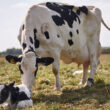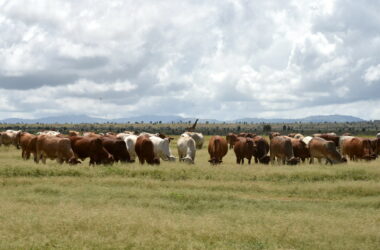By Conrad Mwanawashe

The daybreak is chilly, becoming sunny by mid-morning.
A distance from the hustle and bustle of the capital city, Harare, lies Westgate, a low residential suburb in a dale.
Nestled there, CC Sales yard is a hive of activity as cattle enthusiasts streamed into the auctioneers’ yard sales.
Bulls and heifers, some pedigree Boran, some boran crosses, oblivious, awaited fate. To be sold to an abattoir and destined for the stemming pot, or destined for longer life, at a breeder’s farm for healthy offspring?
And who said cattle lovers were not trendy?

The beasts of the road in the parking lot would make a car showroom green with envy. Ranging from all terrain utility vehicles to executive sleeks, the farmers’ versatility and taste were alive.
A Paris fashion street replayed in the auction yard, from designer clothes, sun hats, and trendy sun shades beating the ultra violent rays, the who is who viewed their next four-legged acquisitions.
Among them was a businesswoman running a healthcare venture. Nothing would sway her from getting her business of the day.In her mind were two bulls, — determined to buy at all costs.
“I would have fought to the death to get those bulls basically,” said Mrs Selina Sibanda with a chuckle after outbidding other buyers at the 8th National Boran Sale held recently under the gumtree shaded floors.
Mrs Sibanda’s father, Jeffrey Zifodya, sat next to her while her husband, Doubt, stood a few metres away, watching as she spoke to Maricho Media.
The bulls came, not without an intense fight.
“Our strategy was that we wanted two bulls, and we managed to buy those bulls. Of course, there was a little bit of a fight. It was work, sweating bids and counter bids. We knew we wanted them, no matter what the price was,” said Mrs Sibanda.
“For me, if I want something, no matter what it costs, it’s not about the money but getting the best. It is for that reason that it’s worth the fight. I would have fought to the death to get those bulls basically,” she added.
At the time that she was conversing with Maricho, she had also already bagged heifers and cows, some of which were to put to bed.
“In fact, one of them is expecting any day from now, so for us, we feel that it was good value for money. It is like you are buying two for the price of one, I think in one case, we may have gotten three for one. That was important,” Sibanda added.
The 8th National Boran Sale followed a day after the Fatstock Competition and Commercial Heifer Sale, both organised by the Zimbabwe Boran Breeders Society (ZBBS) and made possible through sponsorship from Platinum Sponsor, Fivet.

Fivet, has since 2002, been building long-lasting relationships with commercial and small-scale farmers offering management support and quality products aimed at increasing the profitability, sustainability, and efficiency of it’s diverse portfolio of livestock and poultry farmers.
“We did some trainings for the farmers on the best methods and techniques to use with the concentrates giving them as much nutritional support as we could and the results have been good. We are happy to see that the cattle are looking fat and it has been great to see the turnout and Fivet will be back here next year. Fivet has been very happy to release the support over the last couple of months,” said Russell Smith, General Manager – Nutrition.

Among its products, Fivet offers high protein concentrate, High Pro60.
“If you are looking at maintaining your cattle Fivet has launched Nhapitapi concentrate into the market as we are going into winter. That is a very good concentrate to use either as a protein lick or you can mix it into a feed just to get your animals to get through the dry months and the tough season ahead,” he added.
The two events drew cattle farmers from around the country.
International cattle Judge PJ Budler opened the Fatstock Competition with a presentation on A Global Perspective on Profitable Livestock Production (Challenges and Opportunities).
Budler said in an interview on the sidelines that the overall standards were outstanding, especially when it comes to functional efficiency and industry appropriate animals that are adapted to this environment.

“The animals that did well in the female show and the bull show; the differences they had is in terms of overall balance. The cattle were dimensional, so they were long, deep, and thick. The cattle had very good muscle but also were easy fleshing with high-end body condition. They had hormonal balance, so the females were feminine, and the bulls were really masculine,” said Budler.
The big winners of the Fatstock Competition, Collin and Mandy Langton, of Langton Cattle Company, from Trelawney, Zvimba District, Mashonaland West Province, hailed ZBBS for the inaugural competition which they said aimed at educating and teaching young farmers about fatstock, how to feed and group animals and marketing cattle.
Flanked by Daniel Zhuwau, Luxmore Mutengerwa and Edson Musodza, who are part of the “bigger team of approximately 50 cattle breeders,” Colin said the Fatstock competition went very well.
“We won two or three classes in the Fatstock champion pens; we won both champion pens in two divisions. This was a new and exciting event, and we are trying to educate and teach young farmers about fatstock, how to feed, how to group them, and how to market your animals. We put in a lot of hard work, and it takes time because the feeding period is a 90-day period. Fivet are the main sponsors. They sponsored us with food for all the competitors.

“We also had a commercial heifer competition in which we are trying to promote the boran crosses and the boran breed. The heifers had to be a minimum of 50% boran. We did very well there, we won the Champion Heifer, Champion Pen of Heifers, Reserve Champion, and first, second and third for the heifer class. We are very pleased with our results,” said Colin.
Another big winner, Mark Hook, who is also Chairman of ZBBS, was pleased with the condition of animals at the competition and the sale.
Hook himself is an inspiration to many cattle farmers, among them Mrs Sibanda who attended largely because of how well the events were publicised.
The good quality stock and pedigree had good genetics, too.
“We were also largely interested in the education which came with it in terms of how to look after the animals. We had an opportunity to meet those who were looking after animals, and that was fantastic.”
“PJ Budler is renowned for his knowledge and experience in animals and the boran in particular and I guess for us that was the highlight, hearing from him and given how well travelled he is and his extensive experience. We follow Mark Hook a lot. It is important to know where the animals were coming from and who has been looking after them,” said Mrs Sibanda.
She proposed networking sessions where new farmers or those who purchased cattle at the sale are given an opportunity to meet people who have been in the industry for longer.
“Zimbabwe’s future rests in us learning from each other. You can have multiple doctorates, but experience is probably the best teacher when it comes to animals and farming. So, more networking events would be beneficial. You will find that a lot of people will be willing to pay for those.
“Interestingly enough, Mark did offer that our staff can go and learn on his farm and spend two to three weeks learning how they manage animals. I think it’s best to learn practically rather than by reading or hearing other people. We will be following through with that, and we will also be attending as owners to actually learn as much as possible,” said Mrs Sibanda.
Langton Cattle Company herd boy Daniel Zhuwau is already thinking about next year’s edition of the competition.
“My job is to make sure that my animals are in good shape, are healthy, and are well fed. I am happy that as Langton Cattle Company, we won. This shows that our work as people on the ground is being appreciated. It encourages me to work even harder to put more effort in preparation for the next competition so that we win more awards than this year,” said Zhuwau.










